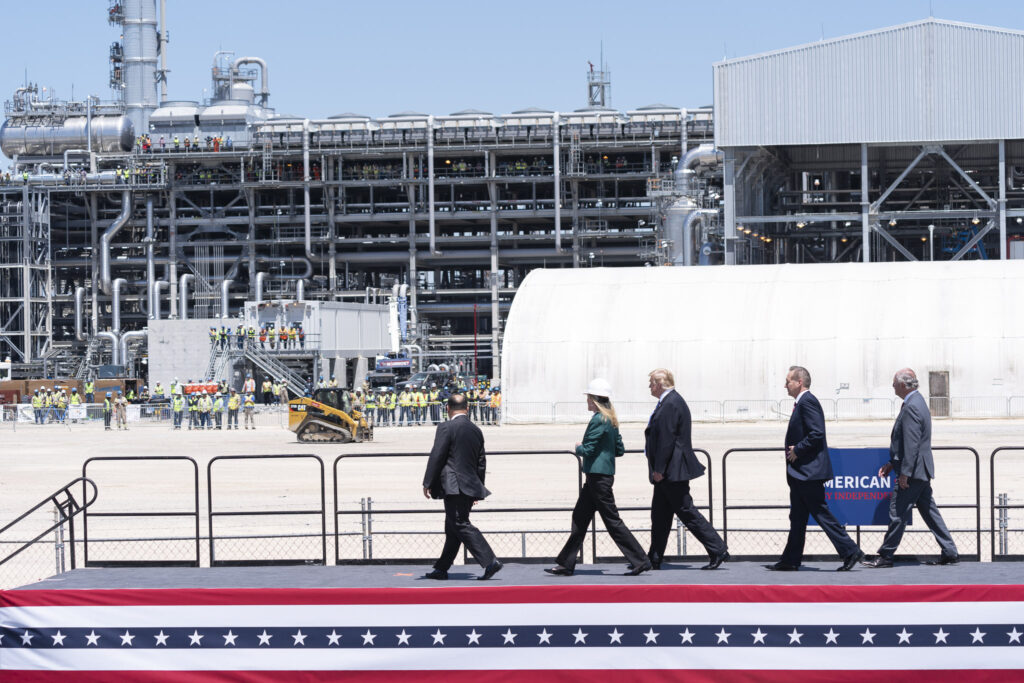By Morgann Rhule, The Invading Sea
The economy typically takes center stage in presidential elections, with candidates focusing on issues such as jobs and inflation — often sidelining issues like climate change.
For young voters, however, the climate crisis is an urgent reality. From stronger hurricanes to record wildfires, they are seeing its effects firsthand.
The 2024 election was no different. Climate change was once again overlooked, leaving college students frustrated and doubtful that their concerns will ever be a priority in national policy – a feeling that was reinforced during President Donald Trump’s first weeks in office.
“I don’t feel like it (climate change) was covered enough during the election,” said Siena Botzrgunter, a geoscience major with a focus on climate change at Florida Atlantic University. ”I think it is very disappointing, especially having such a huge impact on not only the U.S. but the whole world; it should definitely be talked about more.”

In his first week in office, Trump signed a record number of executive orders, including orders encouraging oil and gas drilling, pausing new wind energy projects and rolling back incentives for electric vehicles. One order started the process of withdrawing the United States from the Paris Agreement on climate change, arguing that the accord placed unfair economic burdens on American industries while benefiting other nations.
Botzrgunter said she disagrees with plans to expand domestic fossil fuel production under new Energy Secretary Chris Wright, the former CEO of a natural gas fracking company.
“I think someone in such a powerful role should consider more than just the economy and money; they should think about the long-term effects of what they are supporting,” she said.
College students nationwide will inherit the long-term consequences of today’s climate policy decisions. Many feel their concerns are often ignored in political discourse.
The effects of climate change are “definitely catching up to us,” said Jose Camacho, an environmental engineering major at FAU. “It’s not going to be a matter of who and what politicians are going to do more or not; it’s going to be urgent for survival and the operation of society in America.”
That urgency is already becoming a reality as extreme weather events become more frequent and intense.
“We are seeing these weather events in California and Florida; the hurricane season is stronger than ever,” Camacho added, emphasizing that climate change is no longer a distant threat — it’s here, and its consequences are unavoidable.
Camacho said a middle ground must be found “between a growing economy and a sustainable economy for the environment.
“It’s really complicated because there are things that limit the economy, and I think that’s the issue right now, the country is very polarized,” he said.
For some students, Trump’s withdrawal from the Paris Agreement on climate change symbolized a broader pattern of dismissing climate concerns.

“Trump cares more about economic growth than environmental support and efforts,” Botzrgunter said. “This agreement would impose higher costs on certain things, and I feel like for such an important impact, those costs are kind of nonnegotiable; those costs have to happen.”
Students like Botzrgunter see the costs of inaction as far greater than any short-term financial burden. Liam Baysura, a 21-year-old ocean engineering major, shares that sentiment.
Having grown up in and around the water, Baysura has witnessed the effects of climate change firsthand. Yet, despite his personal connection to the issue, his trust in the government’s ability — or willingness — to take meaningful action remains fleeting.
“I wasn’t too involved in it (politics) because, unfortunately, no matter which side you look at, politicians aren’t entirely advocating for the vast majority of people anymore,” Baysura said.
While he said he stays up to date with climate policies, others don’t even believe climate change is a real problem.
“What’s unfortunate is that climate change isn’t even accepted across our country entirely,” Baysura said.
Despite this frustration, some students remain hopeful, believing that awareness and action are the most effective ways to drive change. Rather than feeling powerless in the face of political inaction, they see education and advocacy as crucial tools for shaping the future of climate policy.
“It is easy to freak out, but there’s no better way to solve them than to inform yourself and then take action,” Camacho said. “Knowledge really is power.”
This mindset is echoed by Baysura, who reflected on his childhood experiences diving at his hometown beach, where he witnessed the reef thrive with abundant marine life. However, these days, there is a noticeable and stark decline.
“That does take a toll mentally,” he said.
Despite this emotional setback, he remains committed to tackling these challenges head-on. “I always like to pride myself on not only rising to the occasion but rising above,” he added.
Similarly, Botzrgunter believes that while many may feel discouraged by the scale of the problem, real change is possible when people unite and care deeply about the issues.
“When the effects are irreversible, people are going to think about it in a different way than they are right now,” she said. “If enough people get together, they can make it happen.”
Morgann Rhule is a senior majoring in multimedia journalism at Florida Atlantic University who is reporting for The Invading Sea during the spring 2025 semester. Banner photo: A climate protest sign (iStock image).
Sign up for The Invading Sea newsletter by visiting here. To support The Invading Sea, click here to make a donation. If you are interested in submitting an opinion piece to The Invading Sea, email Editor Nathan Crabbe at ncrabbe@fau.edu.



